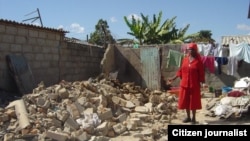HARARE —
Local Government Minister Ignatius Chombo says a national programme to demolish all illegal settlements in Zimbabwe is expected to start soon in Chitungwiza and Seke communal lands.
According to Mr. Chombo, most councils have allowed these settlements to expand without taking the necessary action to block them.
Addressing journalists, government officials and traditional leaders in Harare on Thursday, the minister said the demolition of the illegal structures is expected to start in two weeks.
He said these settlements have been allowed to sprout in most urban and rural councils as local authorities flouted by-laws when allocating land to residents.
He said local authorities have not complied with provisions of the Urban Councils Act, Rural District Councils Act and Regional Town and Country Planning Act, resulting in thousands of illegal housing structures in urban and rural areas.
According to Mr. Chombo the national programme starts in Chitungwiza and Seke communal lands where investigations in 2012 unearthed serious irregularities in land use and management.
The minister added that the government cannot allow this to continue unchecked as there are no proper ablution facilities and other basic necessities at these illegal settlements with more than 10,000 people nationwide.
Mr. Chombo noted that a team of experienced professionals under the guidance of Deputy Local Government Minister Biggie Matiza have been assigned to verify the exact state of affairs in Chitungwiza and Seke communal lands before the demolition of the illegal housing structures.
Residents from these two areas are encouraged to attend meetings lined up by the team starting with Chitungwiza on November 6th.
The team will convene another fact-finding meeting at Manyame Rural District Council on November 15th staring with Ward 1 in Seke North.
The public is advised to approach the Ministry of Local Government for more details on mobile number 0712 804 880 or 791287.
The planned urban clean-up campaign, motivated by health and safety concerns, has evoked fears among some residents of a re-run of President Robert Mugabe's iron-fisted Operation Murambatsvina in 2005 which left over 700,000 people homeless.
In 2005, so-called illegal structures were demolished by soldiers and police on the orders of the then ruling ZANU-PF government. Operation Murambatsvina was widely seen by analysts as a punishment of city-dwellers for giving their overwhelming support to the opposition Movement for Democratic Change.
Reacting to Mr. Chombo’s remarks, Alice Diana Kuveya, a board member of Chitungwiza Residents Trust, told VOA Studio 7 this new exercise reminds many people of Operation Murambatsvina which was conducted by the Zimbabwe National Army and Zimbabwe Republic Police.
And Chitungwiza Mayor Phillip Mutoti, said he will soon engage Mr. Chombo to discuss if some of the structures deemed "illegal" but satisfy certain building standards can be spared to avoid a housing crisis in the city.
According to Mr. Chombo, most councils have allowed these settlements to expand without taking the necessary action to block them.
Addressing journalists, government officials and traditional leaders in Harare on Thursday, the minister said the demolition of the illegal structures is expected to start in two weeks.
He said these settlements have been allowed to sprout in most urban and rural councils as local authorities flouted by-laws when allocating land to residents.
He said local authorities have not complied with provisions of the Urban Councils Act, Rural District Councils Act and Regional Town and Country Planning Act, resulting in thousands of illegal housing structures in urban and rural areas.
According to Mr. Chombo the national programme starts in Chitungwiza and Seke communal lands where investigations in 2012 unearthed serious irregularities in land use and management.
The minister added that the government cannot allow this to continue unchecked as there are no proper ablution facilities and other basic necessities at these illegal settlements with more than 10,000 people nationwide.
Mr. Chombo noted that a team of experienced professionals under the guidance of Deputy Local Government Minister Biggie Matiza have been assigned to verify the exact state of affairs in Chitungwiza and Seke communal lands before the demolition of the illegal housing structures.
Residents from these two areas are encouraged to attend meetings lined up by the team starting with Chitungwiza on November 6th.
The team will convene another fact-finding meeting at Manyame Rural District Council on November 15th staring with Ward 1 in Seke North.
The public is advised to approach the Ministry of Local Government for more details on mobile number 0712 804 880 or 791287.
The planned urban clean-up campaign, motivated by health and safety concerns, has evoked fears among some residents of a re-run of President Robert Mugabe's iron-fisted Operation Murambatsvina in 2005 which left over 700,000 people homeless.
In 2005, so-called illegal structures were demolished by soldiers and police on the orders of the then ruling ZANU-PF government. Operation Murambatsvina was widely seen by analysts as a punishment of city-dwellers for giving their overwhelming support to the opposition Movement for Democratic Change.
Reacting to Mr. Chombo’s remarks, Alice Diana Kuveya, a board member of Chitungwiza Residents Trust, told VOA Studio 7 this new exercise reminds many people of Operation Murambatsvina which was conducted by the Zimbabwe National Army and Zimbabwe Republic Police.
And Chitungwiza Mayor Phillip Mutoti, said he will soon engage Mr. Chombo to discuss if some of the structures deemed "illegal" but satisfy certain building standards can be spared to avoid a housing crisis in the city.





